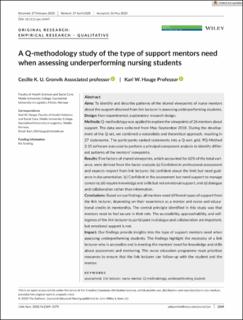| dc.contributor.author | Grønvik, Cecilie K Utheim | |
| dc.contributor.author | Hauge, Kari Johanne Westad | |
| dc.date.accessioned | 2023-10-11T09:18:30Z | |
| dc.date.available | 2023-10-11T09:18:30Z | |
| dc.date.created | 2020-08-11T09:58:22Z | |
| dc.date.issued | 2020 | |
| dc.identifier.citation | Journal of Advanced Nursing. 2020, 76 (9), 2369-2379. | en_US |
| dc.identifier.issn | 0309-2402 | |
| dc.identifier.uri | https://hdl.handle.net/11250/3095735 | |
| dc.description.abstract | Aims To identify and describe patterns of the shared viewpoints of nurse mentors about the support obtained from link lecturer in assessing underperforming students. Design Non‐experimental, exploratory research design. Methods Q‐methodology was applied to explore the viewpoints of 26 mentors about support. The data were collected from May–September 2018. During the development of the Q‐set, we combined a naturalistic and theoretical approach, resulting in 27 statements. The participants ranked statements into a Q‐sort grid. PQ‐Method 2.35 software was used to perform a principal component analysis to identify different patterns of the mentors' viewpoints. Results Five factors of shared viewpoints, which accounted for 62% of the total variance, were derived from the factor analysis: (a) Confident in professional assessment and expects respect from link lecturer; (b) confident about the limit but need guidance in documentation. (c) Confident in the assessment but need support to manage concerns; (d) require knowledge and skills but not emotional support; and (e) dialogue and collaboration rather than information. Conclusions Based on our findings, all mentors need different types of support from the link lecturer, depending on their experience as a mentor and nurse and educational credits in mentorship. The central principle identified in this study was that mentors need to feel secure in their role. The accessibility, approachability, and willingness of the link lecturer to participate in dialogue and collaboration are important, but emotional support is not. Impact Our findings provide insights into the type of support mentors need when assessing underperforming students. The findings highlight the necessity of a link lecturer who is accessible and is meeting the mentors' need for knowledge and skills about assessment and mentoring. The nurse education programme must prioritize resources to ensure that the link lecturer can follow‐up with the student and the mentor. | en_US |
| dc.language.iso | eng | en_US |
| dc.relation.uri | https://doi.org/10.1111/jan.14447 | |
| dc.rights | Navngivelse 4.0 Internasjonal | * |
| dc.rights.uri | http://creativecommons.org/licenses/by/4.0/deed.no | * |
| dc.title | A Q‐methodology study of the type of support mentors need when assessing underperforming nursing students | en_US |
| dc.type | Peer reviewed | en_US |
| dc.type | Journal article | en_US |
| dc.description.version | publishedVersion | en_US |
| dc.source.pagenumber | 2369-2379 | en_US |
| dc.source.volume | 76 | en_US |
| dc.source.journal | Journal of Advanced Nursing | en_US |
| dc.source.issue | 9 | en_US |
| dc.identifier.doi | 10.1111/jan.14447 | |
| dc.identifier.cristin | 1822670 | |
| cristin.ispublished | true | |
| cristin.fulltext | original | |
| cristin.qualitycode | 2 | |

